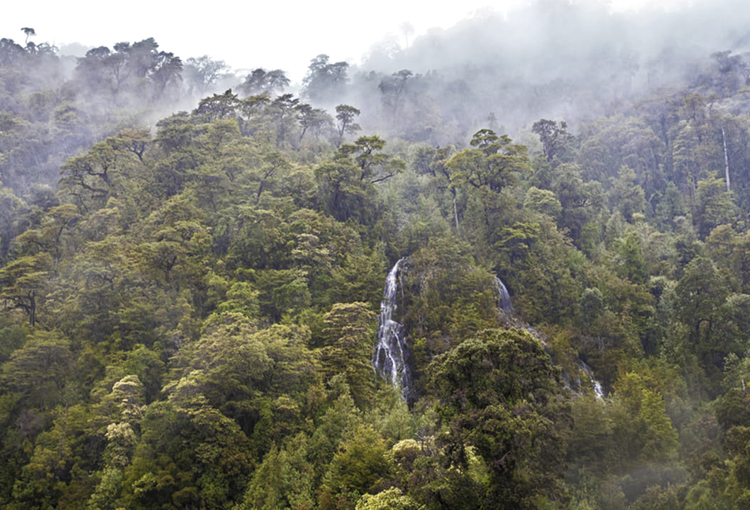Forestry Contractors stated there was "destruction of native forest over 4 years without timely action from the state."For over 20years, since Golden Spring abandoned its projects in Chiloé, the Coihuín de Compu Community fought for recognition of their ancestral rights over more than ten thousand hectares.
Over 30 years ago, in October 1993, the expansion of a rural road alerted indigenous communities that lots A and B of the Tepuhueico estate in Chiloé had changed ownership. The Asian forestry company Golden Spring had purchased 23,891 hectares in Quellón for USD$4.5 million and was preparing to launch a large-scale native timber logging project.
Under pressure from indigenous communities and a series of protests to protect the ecosystem and ancestral rights, Golden Spring abandoned its projects in 1995. However, this did not mean the native forest was safeguarded.
Over the next 20 years, one of the indigenous communities in the area, Coihuín de Compu, exploited 1,059 hectares of Golden Spring’s land, according to a September ruling by the Castro Local Police Court accessed by BioBioChile’s Investigative Unit.
The document reveals that community leaders—who had been granted permission by Golden Spring to occupy the land peacefully—authorized the extraction of approximately 249,000 cubic meters of native timber between 2014 and 2018 alone (prior to this, Conaf lacked satellite imagery to quantify the exploitation).
The corporation’s valuation of the commercialized timber was $3.741 billion, leading to a court-imposed penalty four times that amount: $22.45 billion, the highest fine in history for native forest logging.
A 20-Year Operation
“The wait for the Coihuín de Compu Community is over. We have reached an agreement with Golden Spring’s representatives,” announced Jorge Retamal, National Director of the National Indigenous Development Corporation (Conadi), in May 2018. Conadi paid 4.7 billion pesos for 10,400 hectares from the Asian forestry company, which had abandoned the land over 20 years prior.
However, on those very same lands, just four months earlier, Conaf inspectors had confirmed the largest unmanaged exploitation since the Native Forest Recovery and Forestry Promotion Law was enacted in 2008.
Using satellite imagery, inspectors quantified the forest degradation. In total, across over 1,050 hectares, nearly 250,000 cubic meters of luma, canelo, coihue, tepú, tineo, tepa, female and male mañío, and Guaitecas cypress had been extracted—species crucial to Chilean biodiversity, climate regulation, soil protection, oxygen production, and natural resource provision.
Identifying those responsible was not difficult. Inspectors simply visited Golden Spring’s land during the day and asked the loggers working in broad daylight; the answer was always the same: they had been authorized by Coihuín de Compu’s leaders.
The Chief Admits to Logging
The same indigenous community fighting for ancestral land rights and ownership had been logging the abandoned Golden Spring land, as acknowledged by Chief Américo Lincomán Llaitureo to the Investigative Police (PDI).
“We have a land chief, and the board controls logging through land allocation to prevent clear-cutting. Not all community members exploit the forest; currently, about 40 rely on it as their sole livelihood,” explained Lincomán.
In his statement, Chief Lincomán also claimed they would start charging loggers between “500 and 5,000 pesos” monthly, but Conaf inspectors revealed the actual fee was much higher—reportedly between $100,000 and $300,000 per hectare.
Management Plans
Chief Lincomán defended their forest management, stating they only removed dry wood from unmanaged areas.
“We’ve done tremendous work clearing deadwood. Conaf is amazed—new growth is strong, though more cleanup is needed,” he asserted.
But Conaf’s analysis was clear: only 60,680 cubic meters came from fire-affected zones, while 188,772 cubic meters were logged from virgin forest.
Processed timber went to sawmills owned by Miguel Velásquez, Roberto Muñoz (Compu), and Renato Andrade (Púlpito), per a 2017 complaint by a neighboring indigenous leader. Only Velásquez belonged to Coihuín de Compu (a 1,800-member community) but denied involvement.
Golden Spring, still the landowner during the investigation, knew of the unmanaged logging and had an agreement allowing community use—confirmed by company representative Juan Cristóbal Recart: “(We) permitted peaceful occupation but never authorized logging by outsiders.”
Castro Local Police Judge María Barrientos ruled the company endorsed the exploitation, exceeding its rights as owner since Conaf alone can authorize native forest logging.
A Historic Fine
The $22 billion fine is the highest ever for illegal native forest logging. For context, Conaf in Los Lagos proposed 300 fines totaling 28 billion pesos in 2023—the region with the most complaints (450–500 last year), per Director Miguel Leiva Faúndez.
Leiva told BBCL Investiga he had no record of internal investigations into Conaf officials’ potential awareness of the 20-year logging.
The ruling holds Coihuín de Compu and Golden Spring jointly liable for the fine.
BioBioChile’s Investigative Unit sought comment from current Chief Pablo Inaicheo (who declined) and Golden Spring’s Recart (unreachable abroad).
The community was notified and has not appealed the Castro court’s initial ruling.
Source:BiobioChile.cl







Comentarios (0)
No hay comentarios aún. ¡Sé el primero en comentar!
Deja un comentario